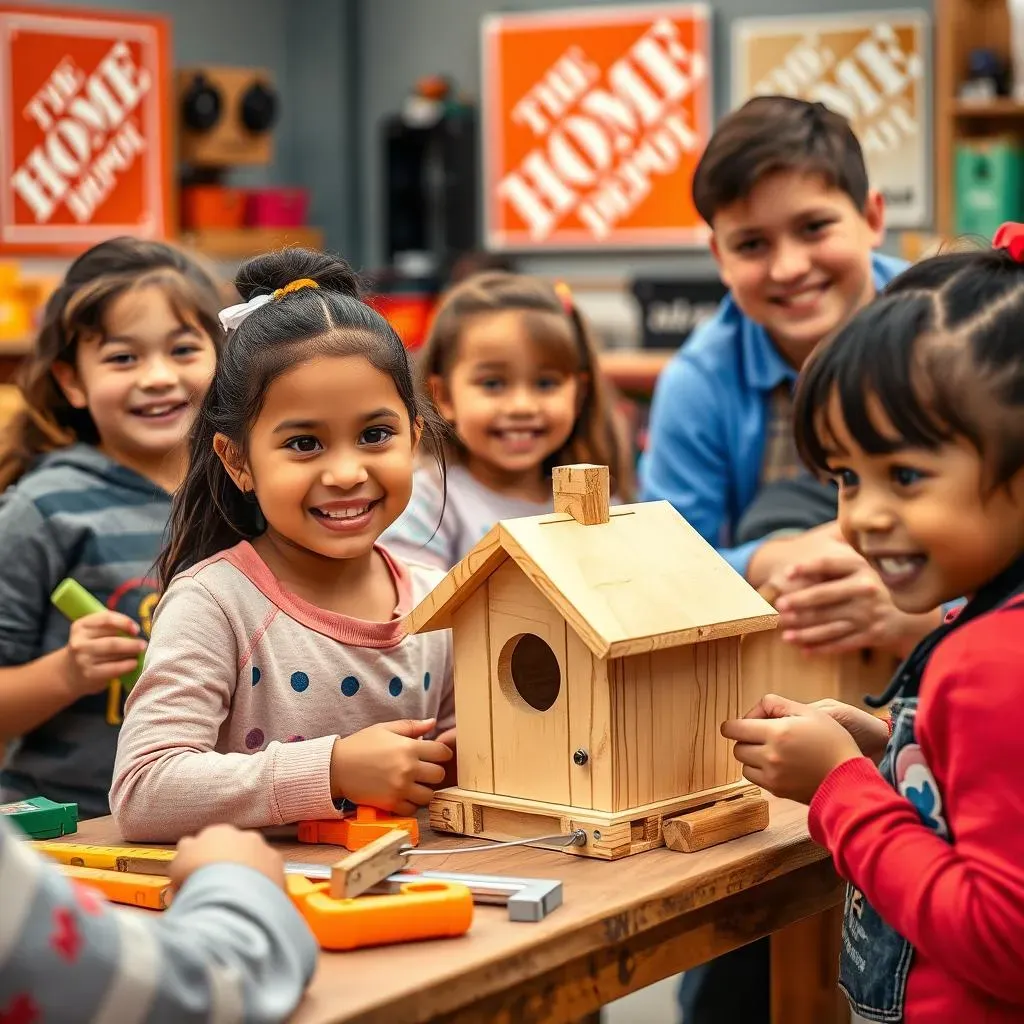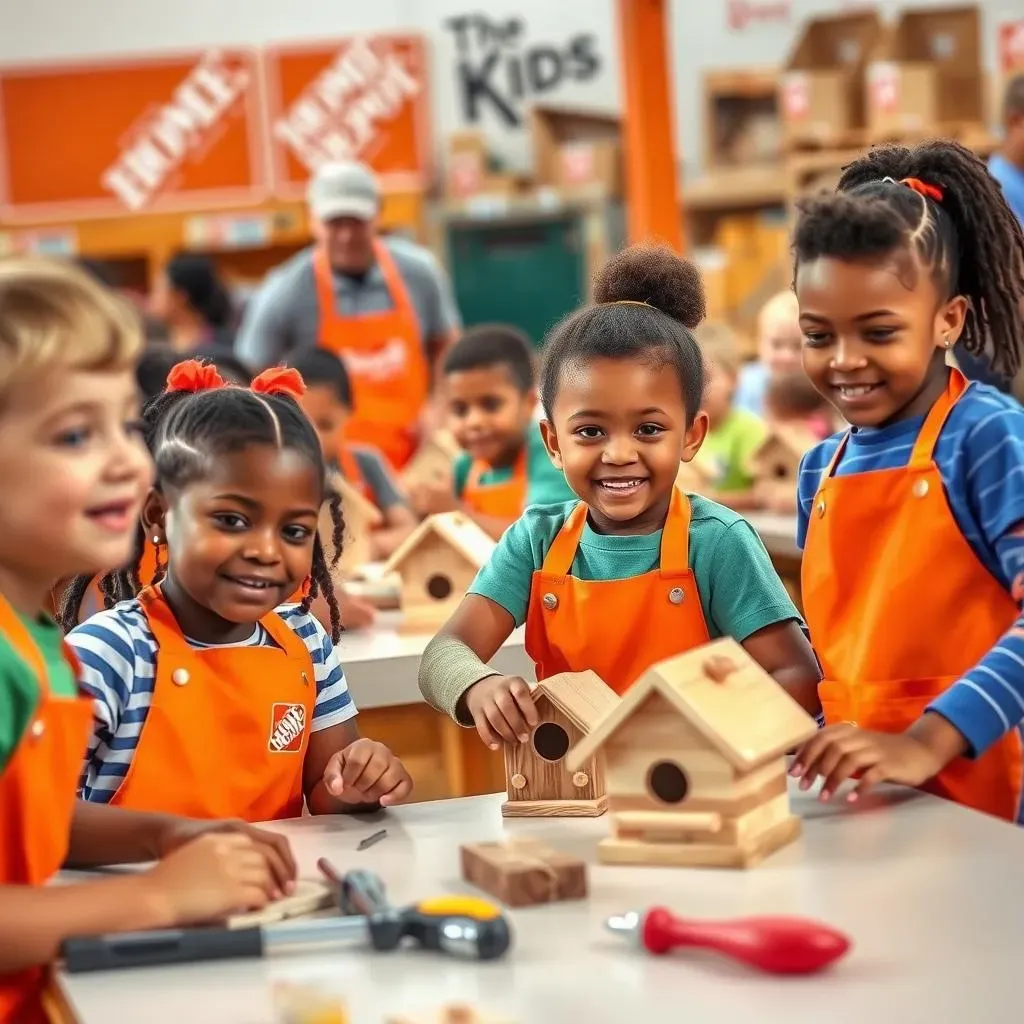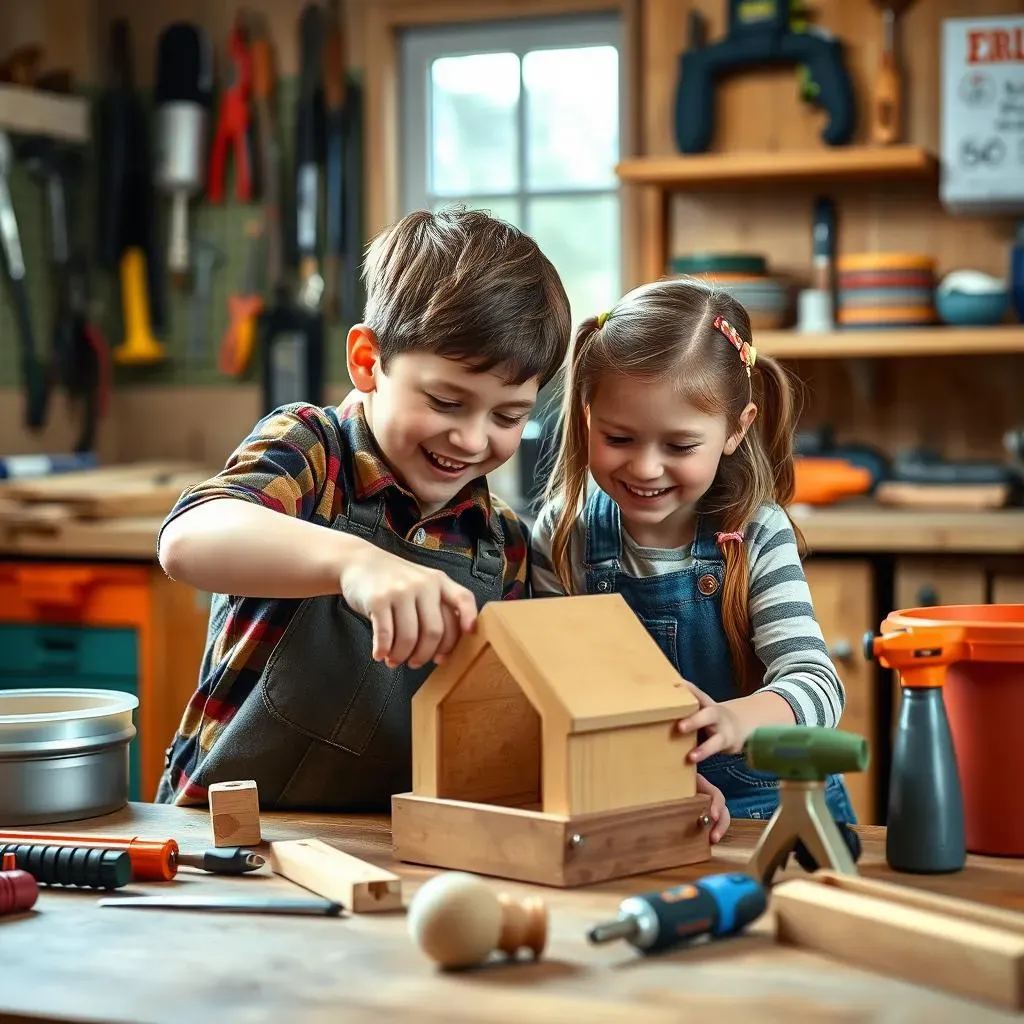Table of Contents
Ever wondered if your little one is ready to wield a hammer at a Home Depot Kids Workshop? The "home depot kids workshop 2024 age" question is a big one for many parents. These free workshops are a fantastic way to introduce kids to the joy of building, but knowing the right age to start can make all the difference. This article will give you the lowdown on what to expect, from the ideal age range to the types of projects your kids can tackle. We'll also share some insider tips to make your workshop experience smooth and fun. Plus, if you find the 2024 workshops don't quite fit your schedule, we’ll point you toward other awesome building opportunities for kids. So, grab your tiny tool belts, and let's get started on figuring out the best age to join the Home Depot fun!
Home Depot Kids Workshop 2024: What Age is Best?
Home Depot Kids Workshop 2024: What Age is Best?
The Sweet Spot: 5-12 Years Old
Okay, so you're thinking about bringing your kiddo to a Home Depot Kids Workshop. Awesome! But what’s the best age? Generally, I'd say the sweet spot is between 5 and 12 years old. Younger than that, and they might need a lot of help, which isn't a bad thing, but it might be more work for you than you bargained for. Older than 12, and they might find the projects a little too basic, though some tweens still get a kick out of it. It really depends on the kid.
Think of it like learning to ride a bike. You wouldn't throw a toddler on a two-wheeler without training wheels, right? Same idea here. Kids around 5 have usually developed the fine motor skills needed to handle the tools and understand the instructions, at least with some guidance. By 12, they’re often ready to tackle more advanced projects, so a simple birdhouse might not be as exciting.
Age Range | Typical Skill Level | Workshop Experience |
|---|---|---|
3-4 Years | Needs significant help | More of a sensory experience |
5-8 Years | Can follow simple instructions | Enjoyable with parental guidance |
9-12 Years | Can work more independently | Engaging and rewarding |
13+ Years | May find projects too basic | Might prefer more advanced DIY |
It's Not Just About Age: Consider Your Child's Interest
Age is just a number, right? Seriously, though, it’s not the only thing to consider. Is your child generally into building things? Do they enjoy hands-on activities? If they’d rather be drawing or playing video games, forcing them to build a wooden car might not be the best idea. You know your kid best. My nephew, for example, was all about building with LEGOs from the time he could crawl, so he was super into the workshops early on, even though he was a little younger than the recommended age. On the flip side, my niece, who’s more into art, didn’t really get into it until she was around 7.
Also, think about their patience level. These workshops can get busy, and kids need to be able to focus, at least for a little while. If your kid tends to get easily distracted or frustrated, maybe wait another year or try a quieter time slot. The goal is to have fun, not create a stressful situation for everyone involved.
Flexibility is Key
Here's a little secret: Home Depot doesn’t have a strict age police at these workshops. They're more about having a good time and getting kids excited about building. If your four-year-old is itching to build, go for it! Just be ready to lend a hand. And if your 13-year-old wants to tag along with a younger sibling, why not? It’s all about making it a positive experience. The key is to be adaptable and go with the flow. Don't stress too much about the "perfect" age, focus on what your child will enjoy the most.
Home Depot Kids Workshop: What to Expect
Home Depot Kids Workshop: What to Expect
What's the Vibe Like?
Alright, so you've got the age thing figured out, now let's talk about what actually goes down at a Home Depot Kids Workshop. Picture this: a bunch of kids, some tools, and a whole lot of enthusiasm. It's usually a pretty lively scene. The workshops are typically held on weekend mornings, and they can get pretty popular. You'll find a designated area in the store set up with tables, tools, and all the materials needed for that month's project. Think of it as a mini construction zone, but way more fun. It’s not a free-for-all, though. Home Depot employees are there to guide the kids and make sure everything stays safe and somewhat organized.
The atmosphere is generally pretty relaxed and encouraging. They want the kids to feel like they're actually building something, not just following a strict set of instructions. Of course, there are steps to follow, but it's all about learning and exploring. The projects are designed to be manageable for kids, with a focus on fun and creativity rather than perfect craftsmanship. You'll see kids of all skill levels, from those who are super focused to those who need a little extra help, and that's totally okay. The goal is for every kid to leave with a sense of accomplishment and a cool project they made themselves.
Element | Description |
|---|---|
Timing | Usually on weekend mornings, check your local store. |
Location | Designated area in the store, often near lumber. |
Supervision | Home Depot employees provide guidance. |
Atmosphere | Lively, encouraging, and hands-on. |
What Kind of Projects Will They Be Doing?
Now, let's talk projects! These aren't complicated, mind you. We're talking simple, build-it-yourself crafts that are both fun and achievable for kids. Think wooden cars, birdhouses, picture frames, or small toolboxes. They usually have a theme that changes each month, which keeps things fresh and exciting. The great thing is that all the materials are provided, so you don't need to bring anything except your kid and their enthusiasm. They usually get a little apron to wear too, which is super cute. It really makes them feel like they're part of the crew.
The projects are designed with safety in mind, using kid-friendly tools and materials. They'll be using small hammers, screwdrivers, and sandpaper, but under the watchful eyes of the employees. The instructions are usually pretty simple too, with clear steps and pictures. The kids get to do most of the work themselves, but there's always someone there to help if they get stuck. It's a great way for them to learn basic building skills, follow instructions, and feel proud of what they've created. Plus, they get to take their finished project home, which is pretty awesome.
"The best way to learn is by doing." - This perfectly sums up the hands-on experience of a Home Depot Kids Workshop.
Home Depot Kids Workshop Age: Tips for Parents
Home Depot Kids Workshop Age: Tips for Parents
Prepping for the Workshop
Okay, so you're all set to go, but a little prep can go a long way. First, check the Home Depot website or call your local store to confirm the workshop schedule. These things can sometimes change, and you don't want to show up and find out it's canceled. Also, find out what project they'll be doing that month, so you can get your kid excited beforehand. Talk about it, maybe even watch a quick video about how to build something similar. This gets them in the right mindset. It also helps to show up a little early; that way, you can snag a good spot and avoid the rush. Trust me, the early bird gets the best tools.
Another thing to consider is what your kid should wear. They’ll be working with wood and tools, so it’s probably best to avoid their favorite clothes. Something that can get a little dusty or even a little paint on it is ideal. Closed-toe shoes are a must for safety, and maybe even a hat if they have sensitive skin. Also, bring a water bottle and maybe a small snack, just in case they get hungry. The workshops are usually an hour or two, and kids can get a little antsy if their tummies are rumbling. It's like going on a mini-adventure, so be prepared!
Tip | Why It's Important |
|---|---|
Check the Schedule | Avoid cancellations and surprises. |
Talk About the Project | Get your kid excited and prepared. |
Arrive Early | Secure a good spot and tools. |
Dress Appropriately | Protect clothing and ensure safety. |
Bring Snacks and Water | Keep hunger and thirst at bay. |
During the Workshop: How to Help (Without Taking Over)
Alright, you're there, the tools are out, and your kid is ready to go! Now's the time to be a supportive sidekick, not the head builder. Let your kid do as much as they can on their own, even if it means it's not perfect. It's tempting to jump in and fix everything, but try to resist. The goal is for them to learn, not for you to create a masterpiece. Offer guidance and support, but let them take the lead. If they get stuck, ask them what they think they should do next, instead of just showing them the answer. Sometimes, figuring it out themselves is the best part. And hey, if things get a little messy, that’s part of the fun!
If your kid is younger, you'll likely need to be more hands-on, but try to involve them as much as possible. Let them hold the hammer, even if you're guiding their hand. Let them turn the screwdriver, even if you're helping to keep it straight. Small gestures like that make them feel like they're actually building something, and it boosts their confidence. If you have more than one kid, try to divide your attention equally, or better yet, get another adult to tag along. That way, everyone gets the help they need without anyone feeling left out. Remember, it’s about making memories and having a great time together.
After the Workshop: Celebrate the Achievement
So, the project is done, and your kid is beaming with pride. Awesome! Now's the time to celebrate their accomplishment. Don't just toss the project in the car and forget about it. Talk about what they built, how they did it, and what they learned. Ask them what their favorite part was and if they'd like to do it again. Display their project somewhere special, like their bedroom or the living room. It’s a little reminder of their hard work and creativity. You can even take a picture of them with their creation, so they can look back on it later.
The Home Depot Kids Workshops are about more than just building things. They’re about fostering creativity, problem-solving, and a sense of accomplishment. They’re also about spending quality time together, which is something that we can all use a little more of. So, whether your kid is a budding builder or just curious about trying something new, these workshops are a great way to spark their interest and make some fun memories along the way. And hey, you might just learn a thing or two yourself! Remember, the goal is to have fun and create something cool together.
Beyond the 2024 Home Depot Kids Workshop: Other Options
Beyond the 2024 Home Depot Kids Workshop: Other Options
Lowe's Build and Grow Workshops
Okay, so maybe the Home Depot workshop schedule doesn't quite fit, or you're looking for something a little different. No sweat! Lowe's offers a similar program called "Build and Grow," and it's another fantastic option for your mini-makers. Like Home Depot, they provide free, hands-on workshops for kids, usually held on weekends. The projects are similar – think wooden toys, planters, and other cool crafts. They also provide all the materials and tools, so you just need to show up with your kid and their enthusiasm. It's a great way to keep the building fun going, especially if your child really enjoys these kinds of activities. Plus, it's always good to have options, right?
One thing I noticed is that Lowe's projects sometimes have a slightly different theme or focus, so it's worth checking out their website to see what they have coming up. It's a good way to expose your kids to different types of building projects, and maybe even spark a new interest. The atmosphere is similar to Home Depot, with a focus on fun, creativity, and learning. They also have employees on hand to guide the kids and make sure everything stays safe. So, if you're looking for a backup option or just want to try something new, the Lowe's Build and Grow workshops are definitely worth checking out. It's like having two awesome building playgrounds!
Feature | Home Depot Kids Workshop | Lowe's Build and Grow |
|---|---|---|
Frequency | First Saturday of the Month | Check local store for schedule |
Projects | Wooden crafts, themed projects | Similar, sometimes different themes |
Cost | Free | Free |
Location | Designated area in store | Designated area in store |
DIY at Home: Building Projects
Now, if you're feeling ambitious, why not try some DIY building projects at home? It doesn't have to be anything complicated. You could start with something simple, like building a birdhouse from scrap wood or creating a mini-garden with recycled containers. There are tons of free tutorials and ideas online, and you can tailor the projects to your kids' interests and skill levels. This is a great way to keep the building fun going all year round, and it gives you the flexibility to work at your own pace. Plus, it's a fantastic way to bond with your kids and make some lasting memories.
And let's be honest, sometimes the most fun projects are the ones you create together. You can involve your kids in every step of the process, from planning and gathering materials to building and painting. It’s a great way to teach them about problem-solving, creativity, and teamwork. It also gives them a sense of accomplishment when they see their project come to life. So, even if you’re not a master builder, don’t be afraid to give it a try. Sometimes, the messiest projects are the most memorable. The key is to have fun and let your imaginations run wild!
“The creation of something new is not accomplished by the intellect but by the play instinct.” - Carl Jung